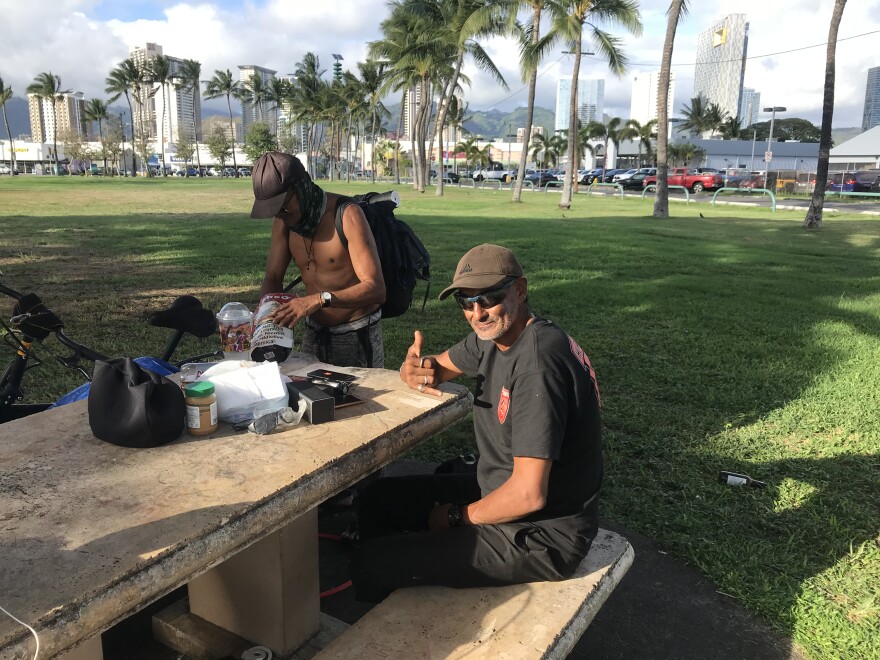Among those who received citations the most for violating the stay-at-home order in the spring were the homeless. As a surge in COVID-19 cases threatens another lockdown, advocates fear that the homeless may be impacted again.
At dusk on a week night near the ramp to the H-1 Freeway on Piikoi Street, Sonya Taglies is settling in for the night with her partner Joe.
She’s been homeless for about five years.
Taglies was arrested during the stay-at-home orders because she and Joe had been in a closed park and she had an outstanding arrest warrant. Because it was a Friday night, she spent the entire weekend in jail.
“We got arrested and lost almost everything,” she said.
Homeless advocates see situations like Taglies' played out time and again.
David Shaku, a case manager with the service provider Hawaii Health Harm Reduction Center, provides support to low-level criminal offenders, such as those cited for sidewalk obstruction and violating the sit-and-lie ordinances.
“If nobody steps in to kind of facilitate that journey to addressing the legal concern, nothing happens. And those tickets just multiply and multiply and multiply until the bench warrant is issued, where they just get arrested and put into jail,” he said.
“When you look at things like the jails, in the middle of a pandemic, is that really the answer to what we want? Do we want to be shoving people in confined conditions with minimal health support?”
His concerns echoed that of the American Civil Liberties Union of Hawaii. After a Hawaii Public Radio investigation into disparate enforcement of the stay-at-home orders, ACLU noted that homeless individuals who get citation after citation can see their legal troubles spiral out of control.
Alvaro Olivares says he's trying his best to take care of the citations he’s received. Olivares was one of the few people left living in Kakaako Waterfront Park after police enforcement sweeps.
“I do community services if I can. if I have a little bit of extra cash that I can afford,” he said. “I pay $20, $25, $100.”
He was able to make some money doing landscaping work, but that job hasn’t been possible because of COVID-19. He could use the money paying citations for other expenses, he said.
The city stopped formal clearing of homeless encampments set up in parks during the height of the stay-at-home orders, between March 23rd and April 20th.
However, enforcement of laws like park hours have been reinstated. The city's Office of Housing exective director, Marc Alexander, said enforcement only occurred after the city launched additional services, including the POST tent facility, a temporary triage center for the homeless in Keehi Lagoon Park.
“We established POST. We also had 24/7 transportation available so that if HPD encountered someone in the park at two in the morning, and they wanted to get housed, we had a van that could take them right from wherever they were on the island, right to POST,” he said.
“Once all those things were in place, we felt very comfortable in enforcing the law and protecting homeless persons, as well as the general public.”
Alexander said in anticipation of a second wave of coronavirus triggering another shutdown, the city is continuing the POST program and keeping the homeless quarantine facility on Kaahi Street open.




